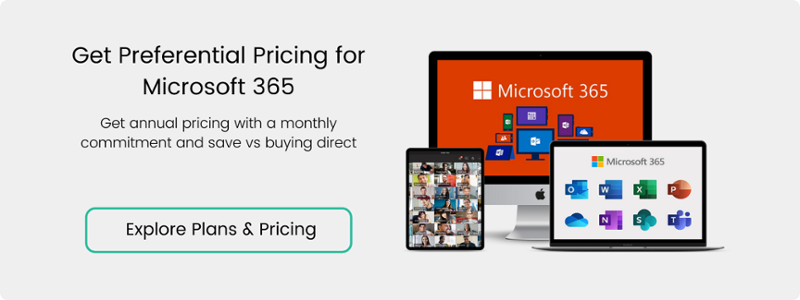Microsoft 365 Enterprise
What is included in Microsoft 365 Enterprise?
Microsoft 365 is a comprehensive package of computer applications that have been optimised for business use. The package offers a breadth of collaboration tools to help companies enhance productivity. Microsoft operates a cloud-based model it is generally considered a flexible and easy to use option for business users in many different industries.
What is a Microsoft Enterprise account?
There are several different ways that companies can choose to access Microsoft Office 365 - the two most popular options for businesses are through a Microsoft Office 365 Business account or a Microsoft Office 365 Enterprise account.
Office 365 Enterprise has been designed with large companies in mind, although there are plenty of benefits for smaller companies. There are several reasons small and medium companies might also decide that an Office 365 Enterprise account is right for them - particularly where they need the most advanced productivity capabilities and premium security options.
What is included in Microsoft 365 Enterprise?
Since its launch in 2011, Office 365 has become a firm favourite with businesses and individual users around the globe. In fact, with nearly 150 million daily users it is one of the most ubiquitous commercial software packages used today because of the breadth of features it offers.
An Enterprise account will provide access to the most popular and well-known Microsoft applications such as PowerPoint, Word and Excel, as well as OneNote and Microsoft Access (the latter being available on PCs only).
As you might expect, users will be able to access Microsoft Exchange and Outlook. Because Office 365 Enterprise has been designed with big businesses in mind, it comes with an impressive 100 GB of mailbox storage, coupled with unlimited archive storage as an archive.
Microsoft Office 365 Enterprise users will also be able to access Microsoft Teams, which builds in many of the features that Skype for Business users will be familiar with. Teams is a simple and highly effective conferencing tools that can be accessed from a range of devices. Your staff will be able to collaborate remotely and share and store documents using SharePoint and Yammer, access files through OneDrive, and create documents on Sway and Stream.
Enterprise account holders will also benefit from customising their email domain addresses, which is something that many companies find extremely valuable when it comes to marketing and customer support and relationship building with potential clients. Helpful tools like Microsoft Forms, Planner, and To-Do all help increase work productivity.
The various iterations of Office 365 all come with good security add-ons. The sophisticated security package that comes as part of the Enterprise account includes Microsoft Advanced Threat Analytics and specialist applications to protect against cyber breaches such as Credential Guard and App Locker.

What is the difference between Office 365 Business and Enterprise?
The fundamental difference between Office 365 Business and Enterprise is the number of users accessing the applications through each plan. Those organisations using Office 365 Business will be able to use it for up to 300 individual users. In contrast, companies can use office 365 Enterprise for an unlimited number of users within your company. The unlimited access feature is usually the most appropriate choice for very large companies with well over 300 employees who would all benefit from the applications offered.
For small to medium businesses who could conceivably choose either, one of the primary considerations when it comes to contemplating which of these packages to select is how much the different options both cost.
There is a significant cost difference between purchasing a Business or Enterprise account on Office 365.
Although the basic features available in both Office 365 Business and Office 365 Enterprise are the same, as outlined above, you will benefit from some added features, which means that it does cost more than the Office 365 business package. It is well worth weighing up the options and deciding whether your company will make enough use of the extra options to make it worthwhile paying the additional cost associated with the Enterprise account.
One of the other big perks of the Enterprise account is that it offers twice the mailbox storage of the Business account - 100 GB mailbox storage, compared to 50 GB for Office 365 Business users.
Another key difference between the two different types of accounts is what is known as on-premise Client Access License (CAL) rights. Businesses using an Office 365 Enterprise account will benefit from the ECAL Suite. In short, this gives users the right to set up local servers for applications such as SharePoint, Exchange and Skype. Depending on your business model and whether you have well-established servers (or a reliable third party supplier), this license may be a significant benefit.
Both packages come with an impressive range of analytical tools. However, companies conducting specialised or detailed financial analyses are likely to make good use of the broader scope of analytical tools included in Office 365 Enterprise. These business intelligence tools include advanced functions within existing programs such as Advanced Excel and Delve Analytics. These and the new tools such as Microsoft Power BI Pro can assist users in performing advanced analytical tasks. They are also generally recommended as a valuable way to find a creative range of ways to visualise data on one platform, whether for detailed client presentations or a snappy summary for an internal meeting.
Finally - it is of note that the Office 365 Business package does not include Microsoft Teams and the associated conferencing capabilities. This functionality is included in Microsoft Office 365 Enterprise. Whilst this might not be a deal-breaker, it is one of the elements of the Enterprise package that have made it such a valuable resource for businesses negotiating their way through to a new normal where remote working is becoming so popular.
.png?width=200&height=75&name=Amvia%20New%20Header%20Logo%20(11).png)



.png)